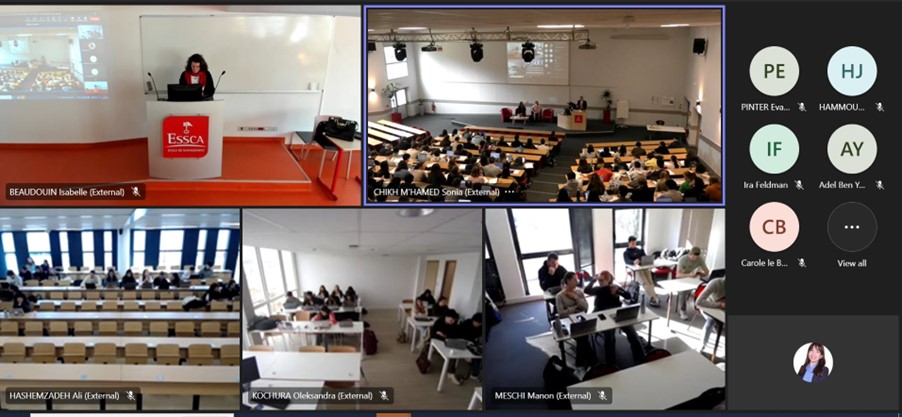Menu
On 2 February, 2024, a critical discussion on sustainability took a big step forward at the “Green Transitions in the Global Environment” conference, hosted by the ESSCA School of Management. ACCEPT was invited to share its expertise and lead the conversation on transforming the energy landscape within the ASEAN nations.
The conference discussed the urgent need to address the dual challenges faced by policymakers, entrepreneurs, and decision-makers worldwide: preventing a deepening recession and social unrest in the near term while steadfastly pursuing sustainable development and bolstering societal resilience. midst threats of increased global fragmentation and economic isolation, the conference ardently advocated for a “Green Transformation,” essential for shifting the global economic paradigm towards a low-emission future. This shift necessitates a dramatic change in regulatory frameworks worldwide, not just within the European Union.
A primary aim of the conference was to explore the multifaceted challenges and opportunities in transitioning towards a sustainable and low-carbon global economy. It aimed to dissect the challenges and solutions across different regions — Europe, the United States, the Asia-Pacific, and Africa & Middle East — offering a panoramic view of the governmental and business policies evolving to manage this fundamental shift. Additionally, it offered a platform for ESSCA students to engage in meaningful discussions.

Photo 1. ESSCA Conference Meeting
The conference was opened with welcoming remarks from Dr. François Viaud, Director of Sustainable Impact and CSR at ESSCA School of Management, Angers campus, setting the tone for a profound exploration of globalisation within the context of Green Transitions. This exploration was further enriched by the “Rethinking Globalisation under Green Transitions Frameworks” roundtable, introduced and moderated by Dr. Sonia Chikh M’hamed. The panel featured a diverse lineup of experts from various regions, each providing unique perspectives on the transition to green economies.
Dr. Peter Hefele, Policy Director at the Wilfried Martens Centre in Brussels, and Ms. Pauline Leré, a Transition Director and Transformation Consultant discusse the green transition framework from European insights. The United States perspective was provided by Mr. Ira Feldman, Founder & Board Chair of Adaptation Leader. From Africa and the Middle East, Prof. Adel Ben Youssef, Associate Professor at University Côte d’Azur (HDR), contributed to the discussion. ACCEPT’s Senior Research Analyst, Aldilla Rakhiemah, had the opportunity to deliver insights from the Asia Pacific region, with a particular focus on the ASEAN energy sector.
Throughout the conference, real-world examples from various countries shed light on how green strategies are being applied across the globe. These case studies covered everything from government policies and community projects to corporate practices that have successfully reduced carbon footprints and promoted environmental care. Aldilla’s presentation highlighted the ASEAN region’s collaborative efforts, knowledge sharing, and policy support essential for achieving sustainable energy goals. She underscored the region’s challenges and opportunities, including technological innovations, financial mechanisms, and the critical role of policy frameworks in facilitating a shift to greener energy. Aldilla’s presentation offered a hopeful look at the energy transformation in ASEAN, showcasing successful initiatives and the potential paths forward for a sustainable energy sector.
The gatherings made it evident that tackling energy policy, climate change, and socio-economic development together is imperative. It called for a united effort, where environmental considerations are part of all economic planning and development. The clear message was the necessity for increased collaboration among governments, the private sector, and communities to accelerate the transition to greener energy solutions.
By convening thought leaders and experts from around the globe, the conference not only served as a forum for discussing the essentials of green transitions but also acted as a springboard for actionable insights and strategies. ACCEPT involvement as a panellist not only led discussions on the essentials of green transition from the ASEAN perspective but also acted as a catalyst for generating actionable insights and strategies.
Join our ASEAN Researchers Network on Climate Change (ARNECC) by registering yourself here. Become a part of our collaborative efforts to address pressing climate challenges and shape a sustainable future.
Detailed information on ACCEPT II can be found at https://accept.aseanenergy.org/
We welcome any future collaboration, please feel free to contact us at [email protected]
